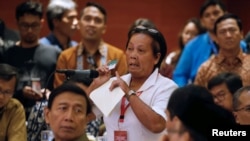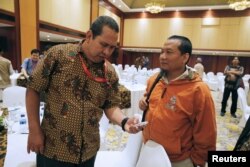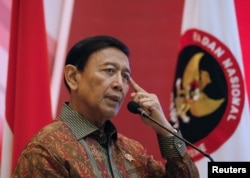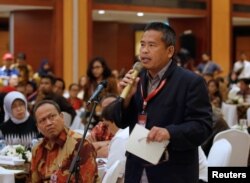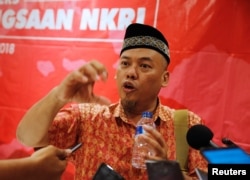The government of Indonesia this week sponsored an event that included dozens of former jihadist militants and terror victims in Jakarta in what the government defends as an effort to better address the growing problem of radicalization in the country.
The controversial three-day meeting ended Wednesday. It brought together 124 former Islamist prisoners and 51 survivors of terrorism at the Borobudur Hotel.
A group of survivors boycotted the event, saying it was insulting to the victims. They also asked authorities to provide compensation to the victims.
The government's National Agency for Combating Terrorism (BNPT) defended the event, saying its initiative could help address the problem of radicalization and foster reconciliation in the country.
"We hope this gathering becomes a way to bring us closer to strengthening our resolve in interreligious and intercultural tolerance in Indonesia," Suhardi Alius, head of BNPT, told attendants during the closing ceremony.
"These events will become a model for the Indonesian people that mutual respect and understanding in building better communication is the first step towards peace," Alius added.
Indonesia, the world's largest Muslim-majority nation, has witnessed a rise in radicalization over the last several years along with occasional terrorist attacks in different parts of the country.
A string of bombings by al-Qaida-linked Jemaah Islamiah in 2002 in the tourist island of Bali killed more than 200 people.
More recently, the rise of Islamic State (IS) in Iraq and Syria and the Maute group in neighboring Philippines have led to hundreds of Indonesians leaving the country to join the terror groups.
Chief Security Minister Wiranto on Tuesday announced his government was investigating the arrest of 15 Indonesian women by Kurdish forces in Syria for alleged ties to IS.
Security approach
Speaking at the reconciliation meeting on Wednesday, Wiranto said his government did not think a security approach alone could combat terrorism.
"If we only implement the hard approach of seeking and destroying, there will be casualties," he said, addressing the victims and former IS members. "Casualties will breed new vengeance, vengeance will breed new terror, terror will breed more hard approach, and it will never end."
Wiranto hailed the victims who agreed to meet former jihadists and forgive them for their misdeeds. He also praised the former jihadists who disengaged from terrorism via the government's deradicalization programs.
The meeting Wednesday included public confessions from the former
militants and prayers for the victims. The first two days of the event were closed to the media.
Muchtar Daeng Lau was one of the militants convicted in the McDonald's bombing in Makassar, Indonesia, in 2002. He has since renounced that violence, which left two people dead and two others injured.
"Today is a new commitment for a peaceful Indonesia. With this gathering, both ex-terrorist convicts and victims want to look forward to a better future," Lau said.
Many survivors also addressed the meeting with forgiveness speeches.
Chusnul Khotimah, a victim of the Bali bombings, said she lost her printing shop in in the attack. She now sells vegetables to provide for her family.
"I was very, very vengeful ... but I turned to God, who is most merciful. So, how can I not also forgive them?" she asked.
Opposition
But not all terror victims welcomed the controversial meeting.
The Indonesian Survivors Foundation (YPI), a major group representing the victims, described the government-organized gathering as flawed.
Sucipto Hari Wibowo, the co-founder of the group, told The Associated Press that many survivors were still traumatized and not prepared to face the perpetrators.
Wibowo is himself a survivor of the 2004 suicide bombing of the Australian Embassy in Jakarta that killed nine people, including the suicide bomber.
"After a decade, perhaps we have finished reconciling with ourselves. We can accept what happened to us, but to reconcile with the attackers is a different matter. It needs a different process," he said.




